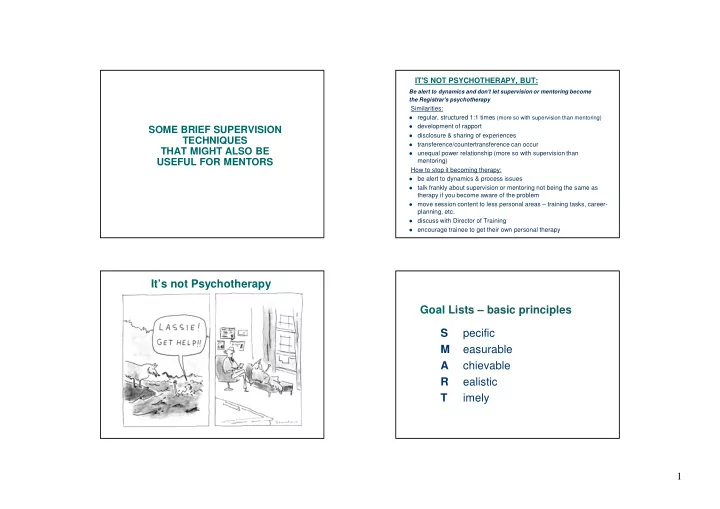

IT'S NOT PSYCHOTHERAPY, BUT: Be alert to dynamics and don't let supervision or mentoring become the Registrar's psychotherapy Similarities: regular, structured 1:1 times (more so with supervision than mentoring) development of rapport SOME BRIEF SUPERVISION disclosure & sharing of experiences TECHNIQUES transference/countertransference can occur THAT MIGHT ALSO BE unequal power relationship (more so with supervision than USEFUL FOR MENTORS mentoring) How to stop it becoming therapy: be alert to dynamics & process issues talk frankly about supervision or mentoring not being the same as therapy if you become aware of the problem move session content to less personal areas – training tasks, career- planning, etc. discuss with Director of Training encourage trainee to get their own personal therapy It’s not Psychotherapy Goal Lists – basic principles S pecific M easurable A chievable R ealistic T imely 1
The Frame Elements of Supervision Note that this structure has a “holding” function and is important in establishing the relationship, and trust (and to some degree, mentoring) The framework, structure and practicalities of the mentoring relationship: – The Frame Respond reliably to contacts from the registrar (however you've set this up – by email or phone, etc.) Mentoring meetings should be scheduled and both – The Content parties should attend reliably Ideally, meet in the same setting like a work setting, rather than, for example, at a coffee shop which inhibits – The Process confidential discussions The Content The Content Identify trainee’s expectations Areas of Focus - examples – may need to provide more guidance for junior – On general clinical situations they're encountering trainees on how to use mentoring – On strategies and interventions they could use – On process and dynamic issues Identify trainee's needs and goals (e.g. transference & counter-transference) – Training-specific goals – On systemic issues the trainee's experiencing within teams, DHB systems, etc. – Career goals – On more personal issues for the trainee, their coping, – Balancing personal life and work goals, etc. life/work balance, how they manage self-care – On specific College training tasks 2
The Process Who’s in the Room ? Rapport and support – establish trust Respect for trainee – Manner of interaction – Confidentiality of issues Secure relationship lets difficult issues be addressed Motivating – positive and encouraging Provision of good modelling and leadership May need to discuss “process issues” in the trainee-mentor relationship at times, and resolve any problems Tactics The Process • Support and empathy • Guided problem-solving Allowing the trainee to grow, be independent and to and use of Socratic make some mistakes questioning to help trainee find solutions and Trainees will have different developmental levels explore options More direct assistance to determine the content of • Model skills sessions may be needed if trainee is quite junior • Let them ventilate – More of a peer:peer relationship later in training catharsis Trainees can regress if stressed or faced with exam- • Advice failure or coping with a new subspecialty and may need more support at those times • Process interpretations and feedback 3
Recommend
More recommend